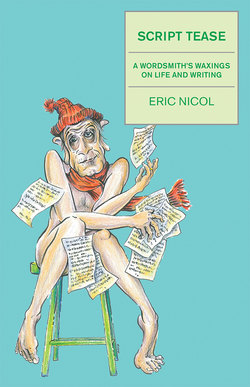Читать книгу Script Tease - Eric Nicol - Страница 19
На сайте Литреса книга снята с продажи.
ОглавлениеREADING AS A RESOURCE
Reading is the best way for the would-be writer to familiarize herself with words put on paper, rather than heard on television or seen in graffiti. Quiller-Couch recommends reading the classics — Homer, Virgil, et al. in the original Greek or Latin, but this may be a tad much for the novice writer whose reading background has been limited to the menu at McDonald’s.
Our mentor stresses the value of reading in absorbing the role of vowel sounds. If the consonants are the percussion section of our verbal orchestra, the vowels are the violins. This doesn’t mean that the composer may use them with abandon (loose vowels), but that they serve as the major affective instrument in the concerto for pen and paper.
So if our Homer is more of a pop fly, what kind of reading provides the best tonic for the writer’s vocabulary? The tabloid newspaper that suffices for too many readers is fashioned for mouth-breathers, folk who view words of more than one syllable as a threat to comprehension. At the other extreme are today’s “critically acclaimed” novels that employ words that have a difficult relationship with their meaning, or are so arcane that even the author seems unsure of their connotation.
The classics are safer for reading. Their durability is testimony to the authors’ concentrating on the story to be told, without readers having to commute to the nearest Webster.
The public library: that is the place to find reading that fructifies vocabulary. Walk straight past the table of latest bestsellers to the stacks that bear the classics. When you check out a work by William Makepeace Thackeray or Anton Chekhov, the librarian will look at you with new respect.
For maximum benefit this reading should be done in bed. The brain seems to benefit from having the feet somewhat elevated. The prone position, too, facilitates distribution of such blood as is flowing to the cortex, though falling asleep over your book may invoke suffocation.
What is not verbally salubrious is reading on the computer. Google is no substitute for good books. On the Internet all paths lead to naughty pictures, regardless of whether the reader set out to check a ferry or train schedule. If he or she is impoverished for human company, the Internet readily seduces the reader into an exchange of e-correspondence with another loner in Tibet — and into the delusion that this matches the quality of the letters of Bernard Shaw and Ellen Terry.
No, the computer, as an editor, has no talent beyond bugging you about your spelling. Picky, picky, picky, and not a good word to say about your punctuation.
